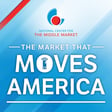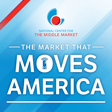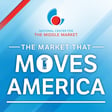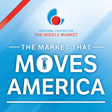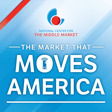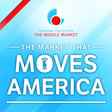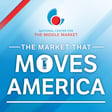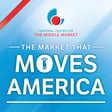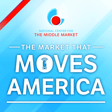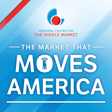Introduction to the Podcast
00:00:02
Speaker
Welcome to The Market That Moves America, a podcast from the National Center for the Middle Market. The center is the leading source of knowledge, leadership and innovative research on the middle market economy. Throughout our podcast, we will feature middle market leaders and stakeholders to hear their real world perspectives on trends and emerging issues.
00:00:21
Speaker
Welcome to the Market That Moves America. My name is Doug Farin, Managing Director of the National Center for the Middle Market, located at the Ohio State University Fisher College of Business. I'm very excited about today's episode as we have a conversation about a recent research report that the Center released in collaboration with the Wells Fargo Commercial Bank. Joining me today is Moses Harris, who's the black and African-American segment leader at Wells Fargo Commercial Bank.
Moses Harris: From NFL to Banking
00:00:54
Speaker
And we did a study together looking at these businesses across the United States. So welcome, Moses. Thank you, Doug. as I'm glad to be here, and I'm very excited about this conversation. Same here. So tell us a little bit about your background and experience.
00:01:15
Speaker
ah Yeah, so I am a 14-year veteran of Wells Fargo. ah Fun fact, I actually interned in Wells Fargo during the great financial recession in 2008. And I spent a few ah seconds in the NFL playing for St. Louis Rams. I got cut and I became a banker. and And after after my time ah within in the NFL, I really enjoyed my internship experience. And so I saw a job posting for an entry-level analyst position in the commercial bank in Oakland, California. And I joined the bank.
00:01:55
Speaker
And I've been here ever since my first job at a college and and have been in the industry. I've worked in four different groups within the bank and lived in four different cities. um So I've moved around, seen a lot, and I've done a lot. And I'm currently, as you mentioned in the intro, I'm currently ah the Black African-American segment leader in commercial banking.
Wells Fargo's Diversity Commitment
00:02:16
Speaker
I get this question every day. Moses, what what what does that mean? What what do you do? and And I'm happy to to break that down. and And it's pretty simple. My responsibility really is to grow, deepen, and retain the existing relationships that we already have ah with Black owned middle market firms. And that's when we do when we talk about middle market, we're talking about companies with revenues between $25 million and $1 billion dollars in revenue.
00:02:46
Speaker
And I'm also tasked with um the acquisition of new relationships. So I work with bankers all across the country to identify opportunities, really help them understand the needs of our customers. And I work with leadership across the bank to tailor solutions. And my favorite part about my job, I get to raise awareness around what's going on with with the Black metal market. I also work closely with ah people across the country to create partnerships and programs and um to help these business owners achieve their personal and business financial goals and you know to to generate wealth for these owners and operators. yeah great Great description of that because I was going to ask you about your your current role. Why is all that so necessary?
00:03:42
Speaker
Well, um if we look as as ah as American citizens, if we look in history, you know, I think in like the 40s and 50s, the ah country was predominantly simply black and white. um And if we we fast forward 150 years and we and we look at 2045, 2050, our country is going to be majority minority. meaning
Adapting to Future Consumer Needs
00:04:12
Speaker
people of color are going to ah make up the majority of our of our country, which is a which is a great thing. um And it's um important that Wells Fargo adopts its products and services to
00:04:29
Speaker
meet the new consumer where they're going to be. In business, we talk about the company that provides the most value wins. The company that's able to meet its customers where they're at wins. It's a way for us to not only survive, but to thrive in the in the new economy. what businesses are going to be doing in 20 years are very different, what potentially potentially different, how how businesses do business is going to change in the future. And Wells Fargo wants to be well positioned ah to to do that. And so at Wells Fargo, we created a line of business called diverse segments, representation and inclusion.
00:05:15
Speaker
um and And myself and a few colleagues ah across the enterprise, we so actually sit in a line of business and we work to roll out the strategy of making the bank more approachable, more friendly. and and in engaging our our commitment and authenticating our commitment with diverse communities. So specifically in commercial banking, there's a women's segment leader, a Hispanic segment leader, Asian segment leader, a veteran segment leader, myself, native segment leader, et cetera.
00:05:46
Speaker
yeah so That was a mouthful, but yeah, that's what we're doing. That's why it matters. That's great. As I've gotten to to know you and work you know had the privilege of working with you over this last year, or year plus, you are very passionate. You have a vision around this, but could you talk a little bit about why this personally why this work personally resonates for you?
Entrepreneurship and Racial Challenges
00:06:14
Speaker
Yeah, so I come from a family of entrepreneurs, small really small, independent ah business owners. My grandfather was a handyman. And my grandmother, ah she was a hack maker um for for many years. And I spent a lot of time with them in the summers. And it it was just really enriching for for my development ah just to watch how Black folks
00:06:41
Speaker
took care of their families economically ah over the over the past decades, very few seldomly was a ah career in corporate America, an option you know for from our but my grandparents. So entrepreneurship was was really the way that they made, took care of themselves and took care of their family. and And I remember a few stories that that my grandma would tell me about what it was like to be an entrepreneur, i.e. ah a Black farmer in the rural South. And she she told me ah this story. ah One day she was about 12 years old. She was working in the fields of her her grandma's house.
00:07:19
Speaker
And it's why a guy gets out the car and he has a ruler with him and he begins to measure the distance between where her seeds were being planted. Because at the time, black folks weren't allowed to plant seeds more than less than 12 feet apart or excuse me, 12 inches apart or foot apart. um And the purpose of that was to ensure that black farmers yields were suppressed and they weren't over overperforming. And my my grandma would always remind us that there's there's there's two Americas.
00:07:59
Speaker
one for Black folks and and one for others. And so this work is really personal to me because when we look at the data, we look at the research, we can see that there is a an inequitable share, an underrepresentation of Black businesses in the middle market, as well as ah publicly traded in the equity markets. and I'm not sure if that story is being told on a national scale. And it's important to me that we continue to amplify. ah There was a study that was done by the US s feds and and essentially said that over a 20 year period, 16 trillion dollars, 16 trillion dollars in gross domestic product was excluded from our economy.
00:08:55
Speaker
because of the lack of economic inclusion of BIPOC communities. Doug. I don't know about you, but $16 trillion dollars is a lot of money, and there's a lot that we can do about that. And going back to where the country's going, we can't afford, we cannot afford to repeat those same mistakes. So this work is is personal, and as an American sit citizen, it's also it's a it's a it's an imperative. It's not a nice to have, it's not the right thing to do. It's like, no, if we are going to be competitive on ah on a global
00:09:31
Speaker
Scale we have inclusion has to be in our business plan. Yep Yeah, it's a great point. And when know when when Wells Fargo, yourself, Dr. Judd Murchie, the team approached us about collaborating on this project, it was really intriguing because I think you you brought up maybe a subtle point there, which is the small business story, I think has largely been kind of explored and told maybe repeatedly.
00:10:03
Speaker
But this idea of looking at what's going on in the middle market um was was really intriguing to us, and that's that that was really important for us as we got engaged into this work. Why do you think it's important to continue to tell this story of the black middle market? Yeah, Doug, you're you're spot on. It's important for for us to tell the story because the advocacy points for a company that's trying to go from $1 million dollars in revenue to $2 million dollars in revenue are very different from a company that's trying to go from $50 million dollars in revenue.
00:10:45
Speaker
to $75 million dollars in revenue, et cetera. Oftentimes in the small business space, we hear access to capital, access to capital, talent retention, et cetera. But when we get into the middle market, the advocacy points are are very nuanced and we need to continue to articulate those stories and the data, empirical data, so that we can as an industry, work with regulators, work with ah procurement officers, work with commercial banks to make sure that the policies and procedures that we have in place are factoring in the key advocacy points that these black businesses in the middle market are offering up.
00:11:35
Speaker
with the data, with the stories and the narratives that everyone understands, we're able to create innovative solutions that brings the middle market up to parity with which where it should be.
00:11:52
Speaker
Yeah, on the opposite end of the spectrum, there are only perhaps five or six publicly traded black owned companies on American stock exchanges, which may come as a surprise to a lot of people.
Historical Context of Financial Exclusion
00:12:08
Speaker
what is your take on that like how did we get to that point because as we discovered through the process of this work like it was very difficult to find middle market companies right that that had black ownership there were above twenty five million like look to give us a little bit of perspective on on that issue so middle market large business like there's just very few of these companies
00:12:33
Speaker
Doug, I so appreciate this question and thank you for giving me an opportunity to to shed light. and And I will say for for our listeners benefit, I don't have the but monopoly on this perspective. You know, these are these my my opinion and and and what I think ah and And I think it it starts with capital, and I think it starts with emanci emancipation, proclamation. I think that in the last 20 years, really the last 10 years, venture venture capital has really been you know a pretty seductive conversation to have and in finance circles with Sequoia Capital and Anderson Horowitz, et cetera. but
00:13:16
Speaker
Venture Capital has been around for for hundreds of years. America was founded ah based on Venture Capital. The term underwriting, you know, we're underwriting ships to to voyage to to new new lands. And so when we think about financial markets and the history of financial markets, really the transatlantic slave trade ah was really the backbone of making financial markets extremely ah robust um from insurance companies to distribute distribution companies, et cetera.
00:13:54
Speaker
um are one One of the first products that was actually traded on the stock exchange were slaves themselves. um and folks at that time did not have access to capital to start their own farm, to start their own venture. Legally they could not, until racial segregation was a law and it and indeed prevented ah people of color, specifically black folks from starting a business, owning their business, et cetera. But we did have some hope in 1865 with Emancipation Proclamation
00:14:32
Speaker
which, you know, let black slaves um participate in the in the American dream. And on the heels of Emancipation Proclamation, we had the Federal Bureau Act of 1865, which was really, really powerful. And most Americans know it as ah the 40 Acres and the Mule. And so from that, I think only about 15% of Black slaves actually received their actual 40 acres and a mule. um And after nine months of that act going live, it actually was terminated by the the next regime. Following that, doug we we we had the Reconstruction period.
00:15:19
Speaker
which layered in Jim Crow, Black Codes, and other ah systemic programs and institutional policies that really kept Black folks as under class citizens. So what Black folks would do is they would work in communities to raise capital, ah venture venture capital, um to get their forms get their excuse get their farms off the ground as agriculture was like 90% of the economy at the time. And ah to scale, ah Doug, we had to distribute the capital, excuse me, distribute the products. And that was really hard for for black folks to to do. um So folks that were able to really benefit from from the robust financial markets
00:16:11
Speaker
ah We're able to buy assets and businesses at market market lows. If we think about the Great Depression in 1929, a lot of Americans suffer from that, but there were very few ah industry titans that were able to you know buy up steel lines and equipment excuse me oil oil refineries, etc., which are I barrier to entry industries, ah commercial real estate, et cetera. So now as we move through the decades, these ah businesses were able to become incumbents in the capitalist society that really gave them an advantage.
00:16:57
Speaker
but regulation regulations were looser at the time. And fast forward, again, you know black folks weren't really invited to the party, did not have access to contracts, didn't have access to equipment, et cetera, at the at the same pace as their're their white counterparts. So you you have folks that really had um decades and decades and decades of a head start to participate in the American dream. And the majority of the companies that we see um on the publicly traded markets generally were founded
00:17:37
Speaker
and over 50 years ago. And so we look at the average the average date of the of middle market companies, they have a birth date under 40 years. So I know that was ah that was a bit of ah a long-witted answer, but I'll close with with like a quick quick analogy. So Doug, in my house, we had a family fun night every Friday. And we got to pick the different games that that that we wanted to play. And my favorite game growing up, Doug, was Monopoly. I love Monopoly. And my dad somehow would always win. And we had this epic game where my dad won with $1. So I began to watch and study my dad over the years. And what he would do every time he would land on a property, he'd say, I'm buying it. I'm buying it.
00:18:34
Speaker
And so instead of passing or or or you know waiting you know one round around the around the board to you know save up your money and purchase, it didn't matter. My dad would always buy accents. Imagine if your family was playing Monopoly for two hours and doug they said, OK, Doug, now now you can play. yeah Okay. So, so, so you roll and you land on Baltic Avenue. Okay. Your sister has three houses on it. So you got, you gotta, you have to pay her. Okay. So there's your, there's your little, your little money. Then you, then you roll again.
00:19:23
Speaker
And then you turn to you turn the right corner and then you land on St. Charles play place and then you got to pay your brother, you know, $600. What? Okay. and the You keep playing so on and so forth. And then you land on Kentucky app and your mom has a whole tail on it. Right? So on and so forth. The challenge with being a Black business owner at this time is it's like playing Monopoly after two hours. A lot of the assets have been acquired at historical lows, and it's hard for Black folks to be able to participate and comedy in any comedy and buy assets.
00:20:10
Speaker
um at a discounted value. Oftentimes we see high levels of of commodity. We see over concentrations in low margin ah industries ah that really are are heavy oriented in the in the labor space and service oriented very kind of and said like industries. Okay. That was a mouthful. Sorry, Doug. but No, great context. No, I appreciate it. I think that context is is very important to understand. so let's Let's jump into the report.
Study on Black-Owned Middle Market Companies
00:20:41
Speaker
If you could, Moses, tell us like what were the goals of Wells Fargo collaborating with NCMM on this study of of black-owned middle market companies? You've already talked about some of the need to have these stories, but what were some of the other goals and objectives that you had?
00:20:59
Speaker
Yeah, you know, really the goal of the report was to be able to provide insights to very interested key stakeholders at the firm and in the industry ah that really wanted to really wanted to understand like Moses, what is going on in in the black middle market? but I was on a call with, this is in 2021 with our environmentally ESG team, And ah at the time, there was a proposal out for sustainability bonds. And if a company achieves certain key performance indicators, KPIs, such as reducing carbon emissions for retaining a diverse workforce, um you know, they would receive a benefit.
00:21:49
Speaker
in the form of maybe a lower interest rate, et cetera. So on the call, I was like, whoa, this is really this is really fascinating. What would it look like if diverse business owners were able to receive ah some type of ah pricing benefit or a different product, et cetera, just for staying in business? So we're rewarding large corporations for hiring low-wage workers, but we're not offering the same incentive for diverse businesses. And I just simply raised that to the folks in the call. And you know the one was like, you know Moses, no one's really ever asked me that question before. Can you help me articulate what what are those advocacy points for Black-owned businesses?
00:22:36
Speaker
And you know at the time, I was well prepared to speak about you know black infant mortality, you know incarceration rates, a recidivism, life expectancy, hyper etc. But I really did not have empirical data, ah Doug, to help me know articulate what really is going on, specifically in the black middle market, not small business, not black homeowners, not appraisal issues, but literally a $75 million black owned company and a $75 million white owned company. that was That was the background and the intentions behind the report.
00:23:19
Speaker
um so that we can tell a story with data. Yeah. And so what were some of the things that stood out with you? What were some of the key findings that and either were surprising or you found most interesting and impactful, so on? Yeah, the thing that but I found the the most exciting um was that the the black middle market is actually growing. and a faster clip than the general market, which I thought was pretty pretty fascinating. and Some of the insights from the leaders that I thought was really impactful that that I wanted to to think through and highlight was some of the things, the the supplier diversity programs, their intentions are are great and they're they're well-founded,
00:24:09
Speaker
um However, down the road as a company begins to grow on scale, it can actually limit their their growth potential. and I thought that was that was interesting insight and I never thought about that before until you know speaking with some of these and reading reading reading the report. who How do you think non-diverse middle market company owners will react to these findings? Do you think there'll be any reaction to it, changes, whatever, either either the companies themselves or maybe we could even talk about like that the banking industry.
Impacts on Banking and Procurement
00:24:49
Speaker
What do you see as some potential impacts there? Yeah, you know, I think recently we saw um the SBA, I think the last last month or two came out with a $5 million dollars line ah line of credit product, which is the first of its kind, the first time that they've that they've done that.
00:25:09
Speaker
And I believe that's because there were years of advocacy ah points that saying, hey, it's really hard for me to get. a line of credit above $2 million. dollars We can get term loans, we can get real estate loans, we see that, but a line of credit, you know it's that to $5 million dollars range historically has been hard for the commercial banking small business industry to lend into. and so that what i'm hoping What I'm hoping that will that will come from
00:25:43
Speaker
from this report is deep insight into the procurement process, Doug, and how Black-owned businesses can participate in that in the ecosystem and the innovation of ah procurement. The worst thing that Black-owned businesses can do, Doug, is to sell antiquated products to corporate America, to sell products that were relevant in 2015, relevant in 2018, and not relevant for 2027. So I'm hoping that procurement and R and&D ah companies are able to rethink how they invite and partner with their ah their supply chain members and invite them into innovation sessions, et cetera, so that Black-owned businesses can work on their strategic plan and make sure that their
00:26:37
Speaker
ah developing in the in the right direction. And on the on the commercial banking industry side, I really would would love ah to expand our existing credit policy. And again, I'm not picking on Wells Fargo, I'm not picking on JPMorgan Chase or US Bank. It's really the way that the OCC and their in our in our regulators think about credit. And I want to go on the record and say credit policy is important. We have to have guy rails. We should be regulated. However, I think that there may be an opportunity to layer in some equitable evolution that factors in all companies and not just the large incumbents and in the industry. Yeah.
00:27:26
Speaker
As you know, we had participation from a lot of different groups who helped us with this study, the key of which is the National Minority Supplier Development Council and their corporate plus program.
Advice for Partnering with Diverse Businesses
00:27:39
Speaker
so we're you We're excited about the opportunities to kind of build this conversation out into into different channels and different avenues and there's ah There's a lot of lot of things we can do, I think, post reports. My last question for you today, Moses, is what advice would you give to companies that are looking to partner with these diverse-owned businesses, whether they're black-owned, Native American, Hispanic? What are you seeing out there, and and what would you say to businesses that want to to get a further engaged with with these companies?
00:28:17
Speaker
i would I would repeat some of the things that I said earlier earlier today, Doug, but really it is the it is the business case for America. Inclusion, diversity, equity engagement, and inviting more diverse business owners to the table to participate in our economy is really how we're going to be sustained as a country over the next 50 years. So for our decision makers and leaders across industries from our our government friends, our business leaders, our our bankers and our bank executives, to really approach the ah ah approach the report
00:29:04
Speaker
with a fresh lens and to take a critical view and ask themselves, how do our existing policy and procedures inadvertently exclude diverse businesses? And I think that's a great place to start. i In these conversations that I really do my best to try to stay away from indicting you know individuals or our individual companies, but really try to think
00:29:41
Speaker
it thinking systems and thinking and policies because that supersedes people. ah when i When I'm done in in this role running my my leg of the race, you know, I'm hoping that someone can build on the infrastructure that that in partnership with others help how lay down. So I'm really hoping that ah from readers of the report think about the systems in which they participate in and challenging ah themselves and and leaders to think in terms of systemic impact and not individual engagement.
00:30:21
Speaker
ye Well, that's a great way to close this conversation, but I think a great way to start, hopefully, a larger conversation across the country. So thanks again for your time. I've really enjoyed this conversation, Moses, and looking forward to to all the great things that we get to do going forward. Thank you, Doug. Thank you, team. This has been fun.
Conclusion and Podcast Subscription
00:30:49
Speaker
So for more information, if you're interested in in accessing the report on black owned middle market businesses, you can visit the NCMM website at middlemarketcenter dot.org. We've got some highlights in there and then you can download the PDF. So welcome everybody to do that and thanks again for joining us. Take care.
00:31:15
Speaker
Thank you for listening to The Market That Moves America. Never miss a new episode by subscribing anywhere podcasts can be found. You can also subscribe to our email newsletter at middlemarketcenter dot.org.

